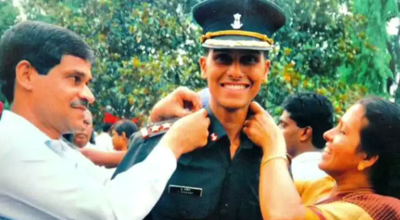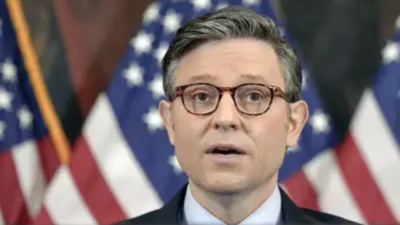For Donald Trump, the target was always China. Beijing knew about it and was getting ready to mount a challenge. Last month, when Trump began with a 10% tariff on all Chinese imports, Beijing warned it was ready to fight any type of war with the US.
“If war is what the US wants, be it a tariff war, a trade war or any other type of war, we’re ready to fight till the end,” China’s US embassy said on X, reposting a line from a government statement earlier. Since then, the trade war between the world’s two superpowers and largest economies has vastly escalated, with neither Trump nor Xi Jinping, his Chinese counterpart, prepared to back down.
When Trump announced massive tariffs against China and most of the world on what he called “Liberation Day”, bringing enormous turmoil to global markets, his aides suggested that he wanted to negotiate better terms with the US trade partners and that he would lower them after negotiations.
Advertisement – Scroll to continue
‘Bad Actors’
On Wednesday, when Trump paused the tariffs for the rest of the world for 90 days, except China, US Treasury Secretary Scott Bessent said investors didn’t understand Trump’s tariff strategy. “The market didn’t understand, those were maximum levels,” Bessent said, adding that Trump “created maximum negotiating leverage for himself”, and that the Chinese have “shown themselves to the world as the bad actors”.
There is no doubt that Trump was under a lot of pressure from his supporters to make a strategic retreat as his tariffs on most of the world threatened the health of the American economy as well as the global economic system itself. It also created a rift within his administration, as was evident in the public row between Elon Musk and his trade advisor, Peter Navarro.
Although Trump says he still wants to make a deal with China, he does not appear very keen to offer any big concessions to Beijing. This is because he genuinely believes that the Communist country’s trade practices and growing presence in the US economy must be checked – and that if anyone can dare to challenge China, it can only be him.
Why Has Trump Singled Out China?
It is true that Trump has been a strong advocate of tariffs for nearly 40 years. He even applied them during his first term, though not so rigorously. It was his campaign promise to restore America’s manufacturing base to its former glory and bring back jobs lost to China and other countries during decades of globalisation.
Most Americans, not just Trump supporters, believe that China has unfairly benefited from globalisation. The United States helped Beijing to join the World Trade Organisation in 2001; China never looked back after that. The government used its Communist system and massive manpower to make China the world’s factory.
Within eight years of joining the WTO, Beijing went on to become the world’s largest goods exporter, from being the seventh-largest in 2000. Within 20 years, its economy grew 12 times and foreign exchange reserves increased sixteenfold to $2.3 trillion.
China’s share of world manufacturing grew from just 6% in 2000 to 32%. Its production is now bigger than the combined manufacturing of the United States, Germany, Japan, South Korea and Britain. But Trump and his advisors feel China has grown at the expense of the United States and other industrialised countries.
Unfair Trade Practices
It’s a common notion in the US and many other countries that China does not play by the rules. There have been allegations that it has been stealing technology from the West to develop its high-tech industries. It has been using massive state subsidies to underprice its products, manipulating its currency and applying restrictive practices to protect its own markets from imports.
The result has been massive trade deficits with the rest of the world-a trillion dollars in total, according to some estimates. In 2024, its trade deficit with the United States, its largest trading partner, was a whopping $295 billion.
In response to the tariffs imposed by Trump in his first term and maintained by Biden, China outsourced some of its manufacturing to other East Asian countries like Vietnam, Cambodia, Malaysia and Indonesia. It then dispatched the finished products to the US from those countries to evade the tariffs. This is the main reason behind Trump’s draconian tariffs.
China’s Export-Oriented Plants
However, what appears to worry the United States most is how China is gearing up for the future. It’s now developing new industrial capabilities and opening new manufacturing units to boost its exports. This poses a threat to manufacturing in the United States. “On the fringes of cities all over China, new factories are being built day and night, and existing factories are being upgraded with robots and automation,” The New York Times reported last week.
Chinese companies are also setting up plants overseas to capture foreign markets. Last year, after India decided to allow foreigners to enter electric car manufacturing, the Chinese auto giant, BYD, had proposed to invest $1 billion in the country. The Modi government rejected this and later agreed to a similar proposal from Tesla. The message was clear: ‘no’ to China but ‘yes’ to America or the West.
These export-oriented industries go hand in hand with China’s mining and processing of rare earth minerals, crucial for modern high-tech products. China controls 70% of their deposits and 90% of their processing technology. The United States heavily depends on these imports.
Losing US Market Would Pinch
As a result of tariffs since Trump’s first term and diversification of sources, the US share of imports of goods from China fell to 13% last year, from 21% in 2016.
If the new US tariffs on China stay, the prices of some US products will rise, which could be a challenge for the Republican Party in Congressional elections due in two years. But Trump believes his political base understands his concern about China.
Of course, tariffs on the whole world would have been a different issue, which explains his decision on Wednesday to target only China and pause the action on the rest of the world.
What Xi Is Thinking
In China though, the scenario is different. President Xi may not have to fight an election, but he can’t afford to tank his economy, which relies on export income. The Communist Party leadership has pledged to pump billions of dollars into the ailing economy. That is now under threat.
The expansion of the factory network across the country is based on the assumption that exports will continue to grow. If Beijing loses its biggest market, its products will find it hard to find alternative buyers. Already, the Chinese economy has not yet fully recovered from the collapse of the housing market in 2021. That crash made many Chinese people poorer, hitting domestic consumption. So, the Chinese manufacturers’ industry can’t sell spare consumer goods at home.
What Can China Do?
China has already announced its retaliatory tariffs against the United States. It has targeted Trump’s base, American farmers, and imposed more restrictions on the export of critical minerals.
Beijing has also lodged a complaint against the US at the WTO. But the trade body is practically toothless; Trump can easily ignore it.
Nonetheless, President Xi has other options if he really wants to hurt the United States. China is the second-largest holder of US debt after Japan, which it can dump. There were rumours in the US market earlier this week that the Chinese were at play when, briefly, the value of the US treasury went down and yields went up.
If China does take such an action on a big scale, it can hike the borrowing costs in the US. Beijing can also decide to sell a large section of its dollar assets, which are estimated to be around $3 trillion.
But that is unlikely to happen because Beijing knows the US Federal Reserve will immediately intervene to protect the fiscal system and Trump will take massive retaliatory action against China. He can isolate Beijing and Xi in the same manner as Biden isolated Russia and Putin. Imagine China being expelled from the SWIFT banking system!
There is a fear in the West and some other countries that China will try to dump the products it can’t sell to the US in other countries. The European Union has already warned against that. India also needs to be on guard.
Diplomatic Campaign
Chinese officials have never been so active in seeking cooperation from other countries in recent memory. On Tuesday, the Chinese embassy in Delhi called on India and China to “stand together” against what it called America’s “abuse of tariffs”. The embassy also stressed the need for the Global South to stand together.
On the same day, Chinese Premier Li Qiang spoke to the European Commission President, Ursula von der Leyen, and said Beijing was committed to fostering collaboration and fair trade. On the eve of Trump’s big announcement of tariffs, Chinese Commerce Minister Wang Wentao met his South Korean and Japanese counterparts in Seoul for the first meeting of their trade ministers in over five years.
Chinese state media said the three countries agreed to respond to US tariffs jointly, an assertion Seoul called “somewhat exaggerated”, while Tokyo said there was no such discussion.
These are attempts by China to unite some of America’s allies against Trump’s tariff policy and fight it along with them. But these countries have reasons to remain sceptical about China’s intentions. Beijing has been in boundary disputes with most of its Asian neighbours. And the European Union views Beijing as as big a strategic threat as the US does. No surprises if the West finally starts seeing India as an alternative to China.
So, there is no option for China but to negotiate with Trump. The trade war between the world’s two largest economies will hurt both, but China will be the bigger loser. Tit for tat will not take them anywhere. As Mahatma Gandhi said, “An eye for an eye will make the whole world blind.” The question is, who will blink first? Trump or Xi?
(Naresh Kaushik is a former editor at the Associated Press and BBC News and is based in London)
Disclaimer: These are the personal opinions of the author












